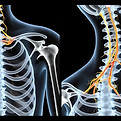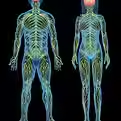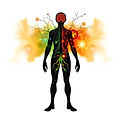The Brain and the Autonomic Nervous System
Here are some basic facts that you may helpful for to understand the basic principles of the mental fitness coaching that uses neuroscience based principles to address the mental patterns that may sabotage you mental and physical health.

The Brain and Our Sabotaging Mental Mental Patterns
Our brain is a complex organ that often harbors mental sabotaging patterns, known as "saboteurs," as identified in the Positive Intelligence program. These saboteurs are automatic mental habits and thought patterns that undermine our happiness and success. They manifest as the inner critic (the inner judge), the controller, the hyper-achiever, the pleaser, the avoider, the victim and other personas that drive negative behaviours and self-talk. These saboteurs are rooted in our survival instincts, but they can lead to stress, anxiety, and self-doubt when left unchecked. By recognising and understanding these saboteurs, we can learn to intercept their influence and shift towards a more positive, resilient mindset. This transformation allows us to harness the full potential of our brain, fostering greater emotional intelligence, improved relationships, and a more fulfilling life.

The Importance of the Vagus Nerve
At the heart of the parasympathetic system lies the vagus nerve, a key player in promoting relaxation and recovery. When the nervous system is regulated, the vagus nerve helps to calm the body, reduce stress, and enhance overall well-being by facilitating processes such as digestion, heart rate regulation, and immune response. Conversely, a dysregulated nervous system, often resulting from chronic stress or trauma, can lead to an overactive or underactive vagus nerve. This dysregulation may manifest as anxiety, digestive issues, inflammation, and a weakened immune system. By nurturing a regulated nervous system through practices like deep breathing, mindfulness, and vagal toning exercises, we can improve our health, enhance emotional resilience, and foster a sense of safety and balance within our bodies.

Our Autonomic
Nervous System
The autonomic nervous system (ANS) is a critical component of our physiology, responsible for regulating involuntary bodily functions such as heart rate, digestion, and respiratory rate. It consists of two main branches: the sympathetic nervous system, which prepares the body for 'fight or flight' responses, and the parasympathetic nervous system, which promotes 'rest and digest' activities. A well-regulated ANS maintains a balance between these two states, supporting optimal health and well-being by ensuring that the body can appropriately respond to stress and then return to a state of calm. However, when the ANS becomes dysregulated, often due to chronic stress or trauma, it can lead to a host of health issues. This dysregulation may manifest as anxiety, hypertension, digestive problems, and a compromised immune system. By fostering a balanced ANS through practices like mindfulness, regular physical activity, and proper sleep, individuals can enhance their resilience, improve their health, and achieve a greater sense of overall wellbeing.

Neuroplasticity
Neuroplasticity refers to the brain's remarkable ability to reorganise itself by forming new neural connections throughout life. This dynamic process allows the brain to adapt to new experiences, learn new information, and recover from injuries. Understanding and harnessing neuroplasticity is crucial for improving our health, as it empowers individuals to make meaningful changes in their lives.
By engaging in activities that stimulate the brain, such as learning new skills, practicing mindfulness, and maintaining physical exercise, we can enhance cognitive function, reduce the risk of mental health disorders, and even improve recovery from neurological conditions. Embracing neuroplasticity encourages a proactive approach to health, emphasising that our brains are not fixed but capable of continuous growth and positive transformation.

The Impact of Rewiring your Brain on your Nervous System
Rewiring your brain through intentional practices can significantly impact your nervous system, leading to profound changes in both mental and physical health. When you engage in activities that promote neuroplasticity, such as meditation, positive thinking, and learning new skills, you effectively alter the neural pathways in your brain. This process can enhance the efficiency of your nervous system, improving communication between neurons and leading to better regulation of bodily functions. As a result, individuals may experience reduced stress levels, improved emotional regulation, and a strengthened immune response.
By consciously rewiring your brain, you can cultivate a more resilient nervous system, which not only supports mental wellbeing but also contributes to overall physical health and vitality. This transformation underscores the interconnectedness of mind and body, highlighting the potential for personal growth and healing through deliberate brain training.

Regulation of the Nervous System and Chronic Illnesses
The regulation of the nervous system plays a crucial role in the development and management of chronic illnesses. When the nervous system is dysregulated, often due to prolonged stress or trauma, it can lead to an imbalance in the body's physiological processes. This imbalance may contribute to the onset or exacerbation of chronic conditions such as cardiovascular disease, diabetes, and autoimmune disorders. The nervous system governs the body's stress response, and chronic activation of this response can impair immune function, increase inflammation, and disrupt metabolic processes, all of which are factors in chronic illness. By fostering a well-regulated nervous system through practices like mindfulness, stress management, and healthy lifestyle choices, individuals can potentially mitigate the impact of chronic illnesses. This connection highlights the importance of addressing nervous system health as a foundational component of preventing and managing long-term health conditions, ultimately promoting a more balanced and resilient state of wellbeing.
